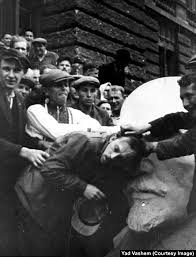
Citizens in Nazi Germany and the occupied territories behaved in a variety of ways during the Holocaust, they ranged from pressures to conform and defer to authority, to opportunism, greed and hatred. In many places the persecution of Jews occurred against a backdrop of centuries of antisemitism. In Germany even those who were not Nazi zealots participated in varying degrees of persecution and murder of Jews and others, and following Nazi occupation numerous people in those countries also cooperated in the onslaught towards the Jews.
In other parts of Europe that were allied with or occupied by Nazi Germany, some leaders and public officials helped, many with relish, to implement anti-Jewish policies. Measures included discriminatory laws and decrees, regarding citizenship, employment, business ownership, and confiscation of property. In Romania, Hungary, Italy, Bulgaria, and France, non-German leaders motivated by home grown antisemitism, and nationalism, acted on their own initiative. Countries allied to Germany, were actively involved in identifying, registering, and marking Jews, in some of these countries Jews were rounded up and transported to the East, most ending up in Nazi extermination camps.
The presence of Jew hunters, some ideologically aligned with the Nazis, and others tempted by the lure of monetary rewards, reduced the possibility of Jews surviving in hiding.
The commencement of the war, soon resulted in Nazi military success, and many people coming directly under their rule, the way ordinary citizens responded to the persecution of the Jews varied, depending on the country, region and degree of Nazi control, existing hostility towards Jews, and perceptions about whether Germany would win the war and remain the master of Europe.
After the invasion of Poland in 1939, large parts of western Europe in 1940, and the Soviet Union in 1941, German forces became thinly stretched across vast occupied areas. There was a need for many thousands of non-Germans, from local officials and police to ordinary citizens to help implement occupation policies, including measures against the Jews and many others considered enemies of the Nazis.
In areas of eastern Europe under Nazi control, non-Germans helped to carry out Nazi policies, including the ghettoization and forced labour of Jews, the seizure or transfer of Jewish property, and the round-up and transport of Jews to killing sites. During the Nazi organised mass killings of Jews, Communists, Roma in occupied Soviet territory, thousands of non-German auxiliary police served as guards and killers, local government officials recruited persons to work as clerks, grave diggers, drivers and cooks, some locals often on their own initiative attacked Jews, robbing and killing them.
In places that the Soviets occupied between 1939 and 1941, the local population often blamed Jews as a group for oppressive Soviet policies, German propagandists aimed to deepen such animosity by linking Jews and Communists to a mythical “ Judeo-Bolshevik” threat.
A small number of people, alone or in organised networks, took risks to help Jews, some offered gestures of solidarity, in Paris for example, some non-Jews wore Star of David badges in protest, in some German cities non-Jews would greet Jews wearing the star, others risked severe punishment, often death when attempting to save Jews, they hid Jews during round-ups, provided them with food, warned them of danger, and cared for their belongings.
Germany's ability to exert their power to gain cooperation from non-Germans was much greater before their defeat at Stalingrad [1942-1943], prior to this many thought Germany would remain the master of Europe into the foreseeable future, now they began to contemplate the possibility of a Nazi defeat, and became less eager to participate in actions for which they might be accountable for after the war, towards the end of 1943 the likelihood of a German defeat was strong, but by this time most of Europe's Jews had been exterminated.
